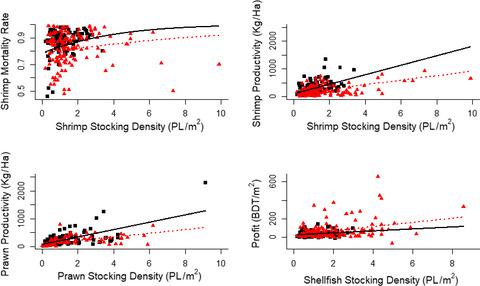Our official English website, www.x-mol.net, welcomes your
feedback! (Note: you will need to create a separate account there.)
Production without medicalisation: Risk practices and disease in Bangladesh aquaculture
The Geographical Journal ( IF 3.6 ) Pub Date : 2020-11-25 , DOI: 10.1111/geoj.12371 Steve Hinchliffe 1 , Andrea Butcher 2 , Muhammad Meezanur Rahman 3 , James Guilder 4 , Charles Tyler 5 , David Verner‐Jeffreys 4
The Geographical Journal ( IF 3.6 ) Pub Date : 2020-11-25 , DOI: 10.1111/geoj.12371 Steve Hinchliffe 1 , Andrea Butcher 2 , Muhammad Meezanur Rahman 3 , James Guilder 4 , Charles Tyler 5 , David Verner‐Jeffreys 4
Affiliation

|
Improved biosecurity and livestock disease control measures in low resource settings are often regarded as beneficial for agricultural productivity, rural incomes, global health, and sustainability. In this paper we present data from a study of shrimp and prawn aquaculture in Bangladesh to argue that this relationship is not as straightforward as it would seem. Analysing quantitative and qualitative data from a multi‐method field study involving 300 “missing middle” farmers, we demonstrate the importance of socio‐economic and ecological conditions to any disease management strategy. We describe how a technical programme to introduce “disease‐free” seed faltered partly as a result of the farmers' tendency to offset disease and livelihood risks by frequently re‐stocking their ponds. Changes to seed provision were accompanied by calls to alter farmers' livestock production practices. Paradoxically, these changes exposed farmers to more intense risks, potentially locking them into unsustainable disease management practices. The analysis emphasises that vernacular farming practices should be considered as key assets rather than barriers to disease management strategies, and that closer attention be paid to value chain and other risks as drivers of unsustainable practices.
中文翻译:

未经医疗处理的生产:孟加拉国水产养殖的风险做法和疾病
在资源匮乏的环境中改善生物安全和控制牲畜疾病的措施通常被认为有利于农业生产力,农村收入,全球健康和可持续性。在本文中,我们提供了孟加拉国对虾和对虾养殖研究的数据,认为这种关系并不像看起来那样简单。通过对涉及300名“失踪的中级”农民的多方法实地研究进行的定量和定性数据分析,我们证明了社会经济和生态条件对任何疾病管理策略的重要性。我们描述了引入“无病”种子的技术计划如何部分地由于农民倾向于通过经常放养池塘来抵消疾病和生计风险的结果而动摇。在改变种子供应的同时,呼吁改变农民的牲畜生产方式。矛盾的是,这些变化使农民面临更大的风险,有可能使他们陷入不可持续的疾病管理实践中。分析强调,应将白话农作法视为关键资产,而不是疾病管理策略的障碍,并且应更加关注价值链和其他风险,将其作为不可持续做法的驱动因素。
更新日期:2020-11-25
中文翻译:

未经医疗处理的生产:孟加拉国水产养殖的风险做法和疾病
在资源匮乏的环境中改善生物安全和控制牲畜疾病的措施通常被认为有利于农业生产力,农村收入,全球健康和可持续性。在本文中,我们提供了孟加拉国对虾和对虾养殖研究的数据,认为这种关系并不像看起来那样简单。通过对涉及300名“失踪的中级”农民的多方法实地研究进行的定量和定性数据分析,我们证明了社会经济和生态条件对任何疾病管理策略的重要性。我们描述了引入“无病”种子的技术计划如何部分地由于农民倾向于通过经常放养池塘来抵消疾病和生计风险的结果而动摇。在改变种子供应的同时,呼吁改变农民的牲畜生产方式。矛盾的是,这些变化使农民面临更大的风险,有可能使他们陷入不可持续的疾病管理实践中。分析强调,应将白话农作法视为关键资产,而不是疾病管理策略的障碍,并且应更加关注价值链和其他风险,将其作为不可持续做法的驱动因素。











































 京公网安备 11010802027423号
京公网安备 11010802027423号